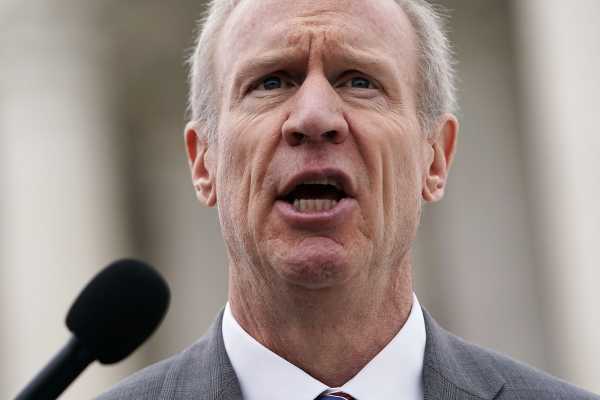
Illinois Republican Gov. Bruce Rauner is not well liked. He is among the least popular governors in the country and has a lower approval rating than President Donald Trump in a state Trump lost by more than 20 points.
This means that the Illinois governorship is, perhaps by far, the most likely gubernatorial pickup opportunity for Democrats this November. They desperately want to improve their numbers in states; Democrats control only 16 governors’ mansions around the country.
On Tuesday, voters will choose the candidates for November’s gubernatorial race in the Illinois primary election.
Rauner, first elected in the 2014 Republican wave, is an uberwealthy former venture capitalist and faces challenges on both the left and the right. In the Republican primary, one far-right state legislator, Jeanne Ives, is trying to kick Rauner off the ballot in November altogether with a socially conservative campaign railing on the governor for having liberal views on abortion and LGBTQ rights. While the race has tightened in the final days, Ives is still trailing in the polls.
Meanwhile, there is a bitterly competitive primary on the Democratic side. Three candidates have been leading a crowded field: venture capitalist and billionaire entrepreneur J.B. Pritzker, who has led infrequent polls; progressive state Sen. Daniel Biss; and developer Chris Kennedy (former Sen. Robert F. Kennedy’s son).
Illinois is in a state of severe financial crisis decades in the making. Its bond rating is hovering one level above “junk” status, and the state went two years without a budget before finally passing one with a significant tax hike last summer. November will undoubtedly be a race about stabilizing the state’s financial situation and breaking Illinois’s long history of corrupt leadership (four of the past seven governors have ended up in prison).
Among the Democrats, Pritzker, who has been dogged by questions about his vast wealth and use of offshore companies, has already focused his campaign on November, spending most of his time attacking Rauner.
If the race does narrow to Pritzker and Rauner on Tuesday, November will be a contest between a billionaire and a multimillionaire. The winner will be whoever convinces Illinois voters he will be able to revitalize the state’s economy and stay aboveboard while doing it.
Rauner is incredibly unpopular, and Illinois is in bad shape
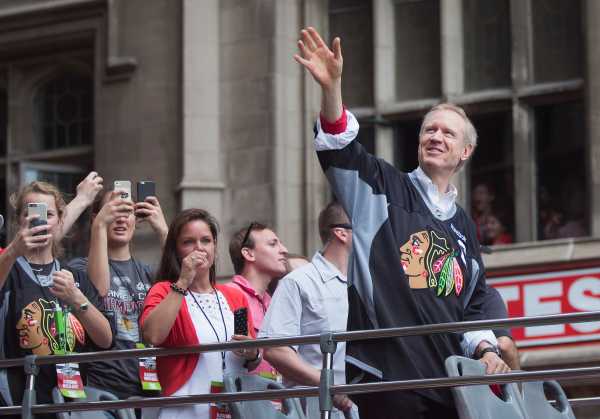

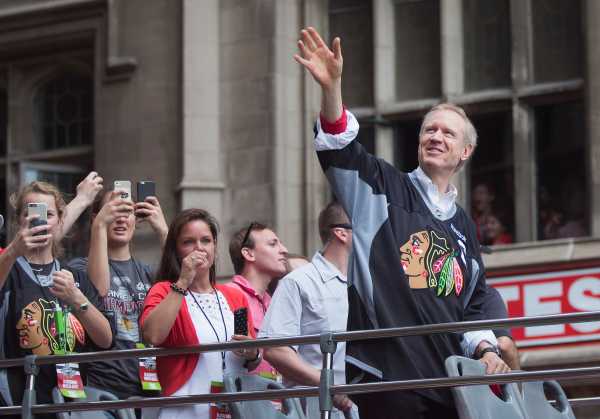
Rauner, a political neophyte, beat the Democratic incumbent Pat Quinn by 5 points in 2014. He ran on an anti-corruption, fiscal responsibility message, saying he would shake up Springfield.
In the following four years, Rauner managed to earn himself the title of “Worst Republican Governor in America” in National Review and saw his approval rating drop to 30 percent.
To conservatives, Rauner — a Republican governor in a blue state — has espoused too liberal views on social issues. He came into office as a pro–abortion rights Republican who promised Republicans he had “no social agenda.” But after Rauner signed a law that expanded taxpayer-subsidized abortions for women covered by Medicaid and state employee insurance, his positions have become a major liability among conservative Republicans voters.
On top of that, Rauner has overseen Illinois in a state of financial crisis. A bitter feud with the Democratic state House Speaker Michael “Boss” Madigan, the longest-serving member of any state or federal legislative body in US history — and arguably one of the most powerful politicians in the country — left the state without an annual budget for two years.
Lawmakers finally passed a budget in 2017 by overriding Rauner’s veto, but the state’s financial health is still grim. Illinois owes more than $15 billion in unpaid bills and has a pension debt of more than a quarter-trillion dollars — the highest in the nation.
In 2002, Madigan sponsored legislation allowing thousands of state workers to retire as early as age 50 and still take advantage of full pensions. State officials estimated 7,400 workers would take the one-time offer, but more than 11,000 did. That will cost the state an estimated $2.3 billion through 2045, according to Reuters.
To offset some of the debt, the state legislature’s budget included a 32 percent income tax hike — the highest in history — which Rauner has promised to roll back if reelected.
Rauner’s campaign has tried to push the blame to Madigan, with Rauner even telling reporters, “I’m not in charge” of the state. But there’s no question that the fiscal instability — and its impact on the state’s social services — has taken a serious toll on the governor’s approval rating, which has sunk to 31 percent, according to a January Morning Consult poll.
Democrats have a big opportunity to take back the governor’s mansion
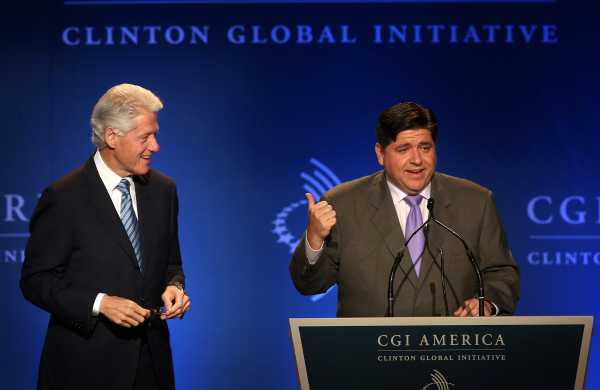

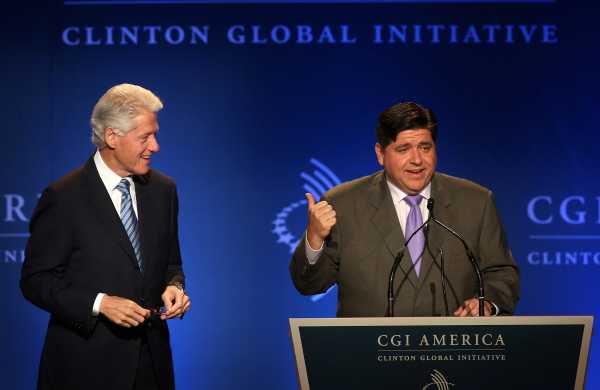
Rauner’s beleaguered first term in office has Democrats excited to take control of the governor’s mansion. Pritzker, Kennedy, and Biss have risen as top contenders from the beginning of the primary.
There’s not a huge amount of daylight between the three candidates on key policy issues — namely, taxes and the budget. Pritzker, Kennedy, and Biss all have the same view on how to fix the state’s budget crisis: by instituting a progressive income tax, where higher earners get taxed more.
Illinois currently has a constitutionally mandated flat tax, where residents are all taxed at the same rate, no matter their income. The concept is relatively new in the state, but voters are receptive, Pritzker and Biss told Vox in recent interviews. (The Kennedy campaign did not respond to a request for an interview.)
“That never was an issue for a gubernatorial candidate to run on,” Pritzker said.
Biss, the state senator who has modeled his campaign much like progressive favorite Bernie Sanders, said it often surprises Illinois voters when taxes come up after years of Democrats and Republicans sidestepping the issue.
“People aren’t used to hearing a Democrat talk about taxes,” he said. “I think that Democrats historically have made a catastrophic mistake on taxes, which is to say the Democrats have fled the issue.”



Taxes are at the top of Pritzker and Biss’s to-do lists. From there, the candidates say, they will deal with other issues including lagging schools, health care, and job creation.
Kennedy and Biss have cast themselves as outsiders to the Illinois establishment, and the biggest fights in the Democratic primary have been over personal wealth and ties to Mike Madigan. Biss and Pritzker have each accused the other of benefiting from a relationship with the speaker while trying to distance themselves at the same time. Pritzker, in particular, took heat for declining to answer whether Madigan should relinquish his seat at a recent gubernatorial debate.
Then there’s the matter of Pritzker’s personal finances, which has loomed as one of the most controversial issues in the race. Pritzker has poured nearly $70 million of his own money into the race, drawing rebukes from Biss and Kennedy.
“It’s a genuinely remarkable and alarming story about money in politics,” Biss told Vox. “Trump spent less of his own money to get nominated president than Pritzker has spent to get nominated governor.”
Pritzker has been upfront about his wealth, which has been the elephant in the room since he launched.
“This race isn’t about money; it’s about values, it’s about the values of social and economic justice and inclusion,” he told Vox. “What voters want is someone who’s going to fight for them.”
He hasn’t been as upfront about the details surrounding his wealth. A recent Chicago Tribune investigation found Pritzker and his brother Anthony Pritzker own several offshore shell companies and trusts where their money is stored. Those companies, combined with Pritzker’s decision to release nothing but the first two pages of his personal income tax returns, have raised questions of whether the billionaire candidate is avoiding taxes as he advocates for a progressive income tax. (Pritzker told the Tribune the trusts are only for charitable contributions.)
Things have gotten particularly nasty in recent weeks, with Pritzker’s Democratic competitors openly calling him a “liar” and “fraud.” But talking to Pritzker, it’s clear he’s already looking ahead to November, spending much of his time attacking Rauner.
“[Rauner is] just not the right man for the job,” Pritzker told Vox in an interview. “He’s a guy who doesn’t understand the difference between business and government. People are feeling really let down by him.”
Pritzker clearly thinks he can come out on top, but his Democratic opponents believe his ties with establishment politics and personal finances will weaken the party’s chances to defeat Rauner come November.
“Bruce Rauner is a failure objectively,” Biss told Vox. “Rauner can only win if someone like J.B. Pritzker is nominated.”
Rauner is getting hit from both sides
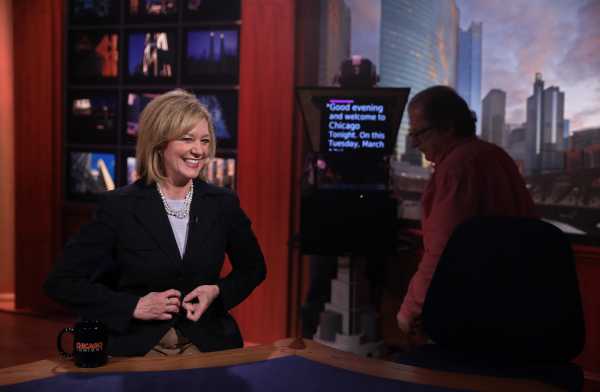

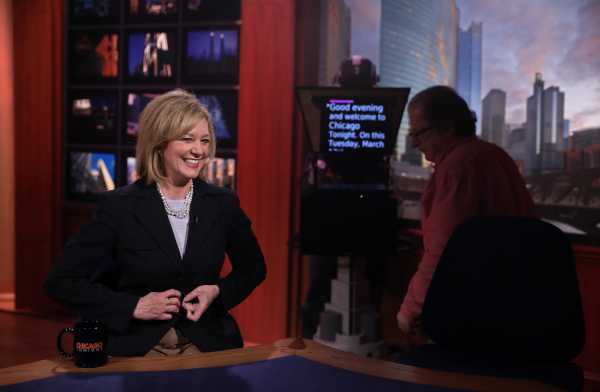
In the Republican gubernatorial primary on Tuesday, Rauner will face Jeanne Ives, a military veteran who has served in the Illinois state house since 2013.
Ives’s pitch: She’s an anti-LGBTQ rights, hard on immigration, anti-abortion social conservative who wants to cut state taxes.
Her challenge made national headlines after she released an ad targeting the transgender community, undocumented immigrants, African Americans, union workers, and women who get abortions all in one. (It showed a deep-voiced and bearded actor portraying a transgender woman thanking Rauner for “signing legislation that lets me use the girls’ bathroom.”)
The chair of the Illinois Republican Party, Tim Schneider, called on Ives to remove the video, saying the “ad does not reflect who we are as the Party of Lincoln and as proud residents of our great and diverse state,” in a statement.
But Ives’s campaign only doubled down on the message; the groups “represents Gov. Rauner’s chosen constituents based on the policy choices he made,” the campaign said, referring to policies that expanded access to taxpayer-subsidized abortions and a law that made it easier for transgender people to change the sex designation on their birth certificate.
Last week, National Review endorsed Ives, calling Rauner a “thoroughly disappointing incumbent governor.” In a single week in January, little-known Republican megadonor Richard Uihlein, who until recently was one of Rauner’s biggest fans, gave Ives $2.5 million to defeat the governor Tuesday. (Uihlein also backed Alabama’s Roy Moore.) Ironically, Ives is also getting a boost from the Democratic Governors Association, which recently started running ads designed to energize her conservative base and damage the governor.
Meanwhile, Rauner is running a mostly self-funded campaign. He personally contributed $50 million two years ago and has picked up support from billionaire hedge fund founder Ken Griffin, who gave $20 million for Rauner’s reelection bid.
Rauner’s campaign has been focused on rolling back the historic state income taxes the Illinois legislature put into place last summer with the budget and painting himself as a political outsider with a clean ethical record.
”He’s still the outsider in a state that’s been run for decades by career politicians,” Will Allison, Rauner’s campaign spokesperson, said.
But while the conservative culture war might not be enough to win Ives the Republican ticket, it could spell trouble for the incumbent in November.
Sourse: vox.com






